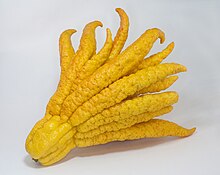Next Delivery : The 5-7 Day Delivery.
Origin: EU Organic
Supplier: A LA CARTE
Medicinal
Buddha's hand has a long history of medicinal use. According to pharmacopoeias, it has the effects of soothing the liver and regulating qi, harmonizing the stomach and relieving pain, and drying up dampness and resolving phlegm. For example, "Compendium of Materia Medica in Southern Yunnan" (page archive backup, stored in the Internet Archive) records that Buddha's hand has the effects of nourishing the liver and warming the stomach, stopping vomiting, and eliminating stomach cold phlegm. Modern medical research has even proven that bergamot has anti-depressant, antibacterial, anti-inflammatory, anti-cancer, anti-tumor, anti-aging, and blood pressure lowering effects.
Citrus medica var. sarcodactylis, or the fingered citron, is a citron variety whose fruit is segmented into finger-like sections, resembling those seen on representations of the Buddha. It is called Buddha's hand in many languages including English, Chinese, Japanese, Korean, Vietnamese, and French.
The different cultivars and variations of this citron variety form a gradient from "open-hand" types with outward-splayed segments to "closed-hand" types, in which the fingers are kept together. There are also half-fingered fruits, in which the basal side is united and the apical side fingered. The origin of this kind of citron is commonly traced back to South or East Asia, probably northeastern India or China, where most domesticated citrus fruits originate.
Usage
Spices
Bergamot is highly aromatic and is used primarily in China and Japan to scent rooms and personal items such as clothing.
Religion
The fruit can be used as religious offerings in Buddhist temples. According to tradition, the Buddha preferred to place the "fingers" of the fruit in a position resembling closed rather than open hands, because closed hands symbolized the act of prayer to the Buddha. In China, bergamot fruit is a symbol of happiness, longevity and good fortune. It is also a traditional temple offering and New Year gift.
In the 19th century, Rabbi Abdallah Somekh from Baghdad and his disciple Rabbi Yosef Hayyim discussed whether Buddha's hands could be used in the Sukkot ceremony. For etrog. The former tended to allow their use, while the latter insisted that various etrogs should not be used without a positive tradition of their use.
Decorate
Bergamot is cultivated as an ornamental tree in gardens and as containers on patios and terraces. In the United States, its unripe fruits have been sold as Halloween decorative novelties under the trademark Fairy Finger.
Food and medicine
Unlike other citrus fruits, most varieties of bergamot contain no pulp or juice. While bergamot is prized primarily for its "delicate shape and aroma," it can also be eaten (usually as a peel or condiment) in desserts, savory dishes, and alcoholic beverages such as vodka or rice wine, or candied as dessert. The sliced, dried peel of the unripe fruit is also prescribed as a supplement in traditional medicine.
インド東北部原産。果実は芳香があり濃黄色に熟し、長楕円体で先が指のように分かれる。名称はその形を合掌する両手に見立て、「仏の手」と美称したもの。学名とは別に、英語では「Buddha's hand」「fingered citron」とも呼ばれる。
-
ブッシュカンの葉
-
未熟果
-
ブッシュカン"open hand" form
ブッシュカン
ページ
ノート
閲覧
編集
履歴表示
ツール
表示 非表示
テキスト
小
標準
大
幅
標準
広め
色 (ベータ)
自動
ライト
ダーク
出典: フリー百科事典『ウィキペディア(Wikipedia)』
ブッシュカン
ブッシュカン "closed hand" form
分類
界 : 植物界 Plantae
門 : 被子植物門 Magnoliophyta
綱 : 双子葉植物綱 Magnoliopsida
目 : ムクロジ目 Sapindales
科 : ミカン科 Rutaceae
属 : ミカン属 Citrus
種 : シトロン C. medica
変種 : ブッシュカン var. sarcodactylis
学名
Citrus medica var. sarcodactylis
和名
仏手柑(ブッシュカン、ブシュカン)
英名
Buddha's hand
ブッシュカン(仏手柑[1]、学名: Citrus medica var. sarcodactylus)は、ミカン科ミカン属の常緑低木樹で、「カボス」「ユズ」などと同じ香酸柑橘類の一種である。レモンと類縁のシトロンの変種で、名前の由来はブッダ(仏陀)の手という意味。
なお、高知県四万十川流域で栽培されている「ぶしゅかん」は、同じ香酸柑橘類の「餅柚」と呼ばれる品種であり、緑色で球状の果実である。ブッシュカンと区別するため、ひらがな表記としている。ブッシュカンを手仏手柑[2]、ぶしゅかん(餅柚)を丸仏手柑(シトロン)と区別する場合もある。
安徽省の鳳陽県には観音菩薩が当地の人たちを懲らしめるために化け自ら切り落とした美女の手と言われている。
特徴
インド東北部原産。果実は芳香があり濃黄色に熟し、長楕円体で先が指のように分かれる。名称はその形を合掌する両手に見立て、「仏の手」と美称したもの。学名とは別に、英語では「Buddha's hand」「fingered citron」とも呼ばれる。
利用
主として観賞用に栽植されるが食用に利用されることもある。観賞用では茶の湯の席の生け花に用いられることも多い。正月飾りにする地域もある。
食用にもするが身が少ないので生食には向かない。一般的に砂糖漬けなどで菓子にしたり、マーマレードにするほか[1]、乾燥させて食べる地域もある。
また、果皮を乾燥させたものは枸櫞皮(くえんひ)と呼ばれ、芳香薬や矯味剤、矯臭剤に用いる。また、枸櫞皮から枸櫞油(くえんゆ)と呼ばれる淡黄色で苦みと匂いのある精油がとれ、矯味剤、矯臭剤に用いる。
Nutritional value:
Organic dried bergamot can cure cough and sore throat.
An antibacterial agent that is extremely valuable to the urethra. It is very effective in dealing with urethral infection and inflammation, mainly to improve cystitis.
It is also very helpful to the digestive tract and can relieve pain, indigestion, flatulence, colic, loss of appetite, etc. during digestion. Excellent intestinal antibacterial agent, can expel intestinal parasites and obviously eliminate gallstones. It is useful for people with anorexia, because bergamot can stimulate appetite. Contribute to infectious diseases of the respiratory tract, such as dyspnea, tonsillitis, bronchitis and tuberculosis.
It is usually quite effective for lip rash, chicken pox, and zoster.
Regulate the function of the uterus, once used to treat diseases transmitted through sexual behavior. Excellent insect repellent.
Cooking method:
You can drink with water or honey, or you can add tea
Special matters: People with yin deficiency and fire, and no symptoms of qi stagnation should take bergamot with caution.
English CookPad: 
Harvest Season: available throughout the year

















